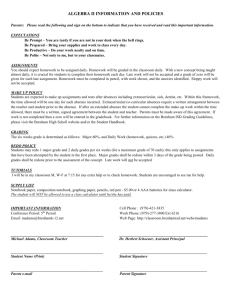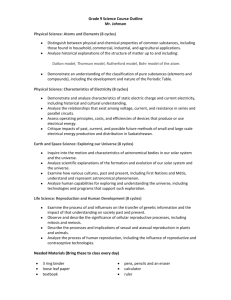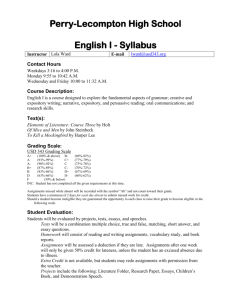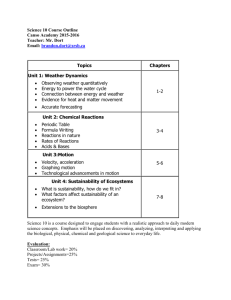IB English 1 Syllabus Fall 2013
advertisement
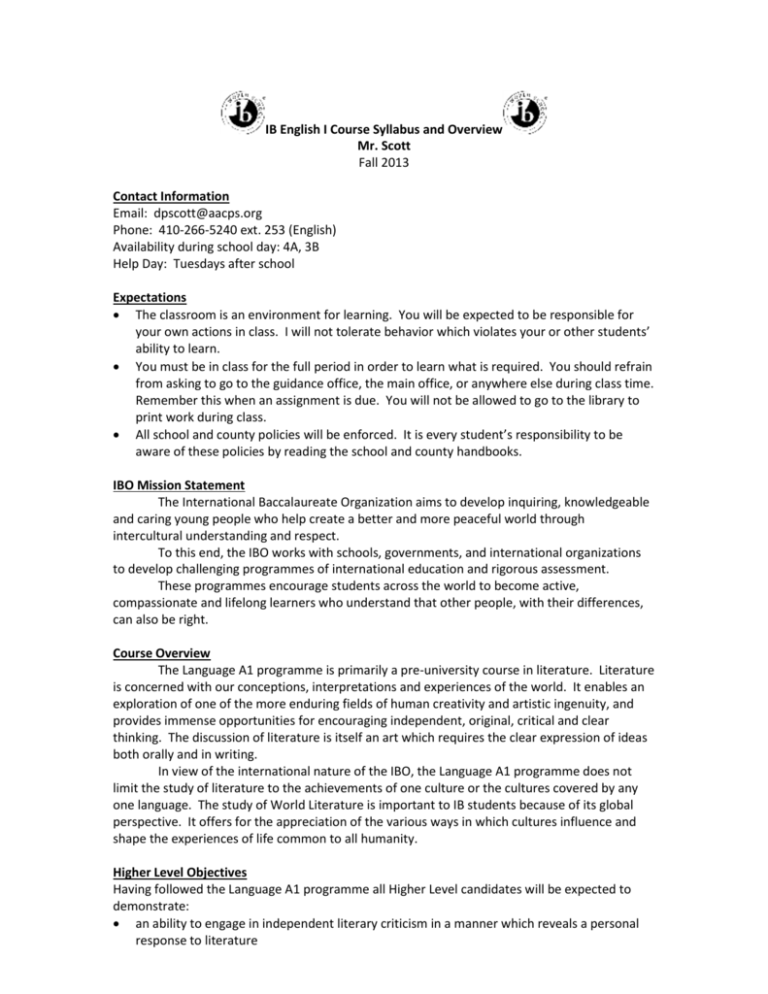
IB English I Course Syllabus and Overview Mr. Scott Fall 2013 Contact Information Email: dpscott@aacps.org Phone: 410-266-5240 ext. 253 (English) Availability during school day: 4A, 3B Help Day: Tuesdays after school Expectations The classroom is an environment for learning. You will be expected to be responsible for your own actions in class. I will not tolerate behavior which violates your or other students’ ability to learn. You must be in class for the full period in order to learn what is required. You should refrain from asking to go to the guidance office, the main office, or anywhere else during class time. Remember this when an assignment is due. You will not be allowed to go to the library to print work during class. All school and county policies will be enforced. It is every student’s responsibility to be aware of these policies by reading the school and county handbooks. IBO Mission Statement The International Baccalaureate Organization aims to develop inquiring, knowledgeable and caring young people who help create a better and more peaceful world through intercultural understanding and respect. To this end, the IBO works with schools, governments, and international organizations to develop challenging programmes of international education and rigorous assessment. These programmes encourage students across the world to become active, compassionate and lifelong learners who understand that other people, with their differences, can also be right. Course Overview The Language A1 programme is primarily a pre-university course in literature. Literature is concerned with our conceptions, interpretations and experiences of the world. It enables an exploration of one of the more enduring fields of human creativity and artistic ingenuity, and provides immense opportunities for encouraging independent, original, critical and clear thinking. The discussion of literature is itself an art which requires the clear expression of ideas both orally and in writing. In view of the international nature of the IBO, the Language A1 programme does not limit the study of literature to the achievements of one culture or the cultures covered by any one language. The study of World Literature is important to IB students because of its global perspective. It offers for the appreciation of the various ways in which cultures influence and shape the experiences of life common to all humanity. Higher Level Objectives Having followed the Language A1 programme all Higher Level candidates will be expected to demonstrate: an ability to engage in independent literary criticism in a manner which reveals a personal response to literature an ability to express ideas with clarity, coherence, conciseness, precision and fluency in both written and oral communication a command of the language appropriate for the study of literature and a discriminating appreciation of the need for an effective choice of register and style in both written and oral communication a sound approach to literature through consideration of the works studied a thorough knowledge both of the individual works studied and of the relationships between groups of works studied an appreciation of the similarities and differences between literary works from different ages and/or cultures an ability to engage in independent textual commentary on both familiar and unfamiliar pieces of writing a wide-ranging appreciation of structure, technique and style as employed by authors, and of their effects on the reader an ability to structure ideas and arguments, both orally and in writing, in a logical, sustained and persuasive way, and to support them with precise and relevant examples. Course Overview IB Section Part I: Works in Translation (1st semester, junior year) Part II: Detailed Study (1st semester, senior year) Part III: Genre Study (2nd semester, senior year) Part IV: School’s Free Choice (2nd semester, junior year) Part I: Texts 100 Love Sonnets by Pablo Neruda Madame Bovary by Gustave Flaubert A Doll’s House by Henrik Ibsen Poetry by Robert Frost Hamlet by William Shakespeare Slouching Toward Bethlehem by Joan Didion 1984 by George Orwell The Great Gatsby by F. Scott Fitzgerald Their Eyes Were Watching God by Zora Neale Hurston “Master Harold” …and the boys by Athol Fugard Flannery O’Connor: The Complete Stories by Flannery O’Connor Love in the Time of Cholera by Gabriel Garcia-Marquez Introduction / 100 Love Sonnets approx. 6 weeks Madame Bovary approx. 6 weeks A Doll’s House approx. 6 weeks IB Assessments External Assessment: Written Assignment (WA) External Assessment: Individual Oral Commentary (IOC) Internal Assessment: Individual Oral Presentation (IOP) Work will begin on the Written Assignment Part IV: “Master Harold” …and the boys approx. 6 weeks The Complete Stories: Flannery O’Connor approx. 6 weeks Love in the Time of Cholera approx. 6 weeks Individual Oral Presentations (IOPs) will begin in the spring Course Policies Academic Integrity To promote the pursuit of academic excellence and learning, Anne Arundel County Public Schools expects its students to conform to specific standards of academic integrity. Academic integrity is an integral part of promoting self-respect, trust, student achievement, and positive relationships among all stakeholders in our school community. Academic integrity means exhibiting honesty in all academic exercises and assignments. Academic dishonesty refers to any form of misconduct that occurs in relation to all formal academic exercises. The academic integrity policy will be strictly enforced. Plagiarism, depending on the degree and case, may result in a zero without the ability to redo the work. Always cite all sources used and consulted while completing assignments. Cheating on any assignment will result in a zero. This includes “helping” another student by giving him or her one’s own work to copy. This is academically dishonest and will not be tolerated. The student who lends his or her work and the student who is copying it will receive zeroes on the assignment. Neither will be able to redo the work. Knowledge and understanding cannot be handed to you but is earned through hard work and perseverance. Using Sparknotes, Cliffnotes, or any other “study aide” deprives you of the learning process. While these may help you complete an assignment, they will not help you in developing your ability to engage in independent literary criticism. Assignments Expectations for all assignments: unless otherwise directed, all assignments should be written in paragraph form with complete sentences. You will lose points if sentences do not start with a capital letter or end with proper punctuation. You should always explain your responses with good reasoning and, if applicable, evidence from the text. Evidence from the text should be cited with MLA parenthetical citations. Finally, work should be neat and legible; otherwise, you will be expected to redo the assignment or type it. Essays: Essays must be typed and follow MLA guidelines. This includes the following components: Times New Roman, 12-point font; double-spaced; 1” margins; parenthetical citations; and a Works Cited page as necessary. Also, include a header, page numbers, and put your name, date, course/period, and teacher in the top left-hand corner. Use MLA guidelines for formatting papers and citing sources. Be sure that you have a reliable printer, ink cartridge, flash drive, etc. Computer or printer problems are not an acceptable excuse for turning in an assignment late. In this circumstance, you will need to print out your paper in the library before class begins. Please plan in advance and make sure to have a backup of your paper. If you are having computer problems, please see me before the due date. Homework: Homework will be assigned most every night and is posted with the outcome. Reading: I highly recommend that you purchase your own copy of the works that we will be reading this year. This will allow you to annotate in the text. Grading Policy Students will receive grade sheets every two weeks to monitor their progress. Students will receive a .1% if a missing assignment may still be submitted for credit. A student may receive a zero (0%) if he or she refuses to do an assignment five days after the due date. When a student turns in an assignment that does not meet the standard, he or she will receive a grade no lower than 50%. The AACPS grading table is as follows: A 100%-89.5% (Outstanding level of achievement) B 89%-80% (High level of achievement) C 79%-70% (Satisfactory level of achievement) D 69%-60% (Low level of achievement) E 59% and below (Failure) Report card grades for this IB English I course will be comprised of the following elements: Homework 10% Assessment 90% (classwork 10%, mastery writing 40%, tests/quizzes/projects 40%) Per county policy, semester grades will be weighted using percentages, not a trend. Each marking period is weighted 40% and the final exam is 20% of the final grade. Parent Notification Parents will be notified at least three weeks prior to the end of a marking period if a student is currently earning a failing grade. At any time, parents may check parentconnect.aacps.org to see their student’s grade. Please contact the guidance office if you do not already have a login. Late work and Re-do Policy Late work penalties may not exceed a 10% drop in the grade up to five business days after the assigned due date. If an assignment is turned in after the assigned due date, students will not be allowed to redo the assignment to improve the grade. Therefore, it is highly encouraged that students who turn in late work meet with the instructor to ensure that the work turned in is of high quality. After five business days if no effort has been made to turn in missing assignments, students will earn a 0%. Students are encouraged to be responsible and discuss any issues that cause assignments to be late, and on occasion, extensions will be allowed for extenuating circumstances. Students must inform the instructor why the deadline was not met. The instructor will contact parents or guardians when work is not being submitted in a timely manner. If the behavior continues, guidance and administration will be informed. Since the objective of the course is to master the standards, there will be occasions to redo assignments. It is important to maintain the integrity of this policy. Having the ability to redo assignments should not lead to not studying for assessments and turning in halfhearted attempts at work with the intention of redoing it later. This policy is to support the development of mastery of standards. If the spirit of this is violated, this privilege will be denied to any students violating the intent of the redo policy. Opportunities for redos are done at teacher discretion. Students, please note: If you want to redo an assignment, you must have a conference with me within two weeks of when an assignment is returned with feedback. Before a redo will be considered, you must have completed any formative assessments related to that assignment and any missing summative assessments. Depending on the nature of the assignment, you may receive an alternative assignment that assesses the same standards rather than merely revising the work previously submitted. Finally, we will set a due date for the new assignment. You must turn in the assignment by the agreed upon date in order to have the assignment re-graded. WARNING: There are very few opportunities to redo reading checks. This being stated, you should come prepared each day. Required Supplies Students must bring the following to class everyday: 1) required reading texts (no extra copies will be handed out) 2) 3-ring binder / Notebook (either a spiral notebook or marble composition book) 3) college-rule loose leaf paper (required for reading quizzes and other work to be turned in during class) 4) blue or black pen 5) planner for homework assignments and due dates Supplies that are not needed everyday: 6) colored pencils 7) highlighter 8) post-its Attendance Policies The school tardy policy and county attendance policy will be enforced. Absence notes should be given to me at the beginning of the first class back. If you have three or more unexcused absences in a quarter, you will fail, regardless of your grade in the class. It is your responsibility, not mine, to receive and submit make-up work for any days that you miss. You have an equal number of days to make-up work as days missed. Complete all missing work within the allowed time limit. You should see me before or after school to ask questions about missed assignments. NOTE: If you are absent when a major assignment is due, then it is your responsibility to turn it in at the beginning of the next class in order to avoid deductions in points. If you are absent the class before a due date, you still must turn in the assignment or take the assessment on time if it was announced prior to your absence. Cell Phone Expectations There will be opportunities for students to use their cell phones during class for academic purposes. During these times a green sign will be displayed at the front of the class, signifying that cell phone use is permitted. During non-cell phone use times a red sign will be displayed, informing students that cell phones should be away and on silent mode. We have read the course syllabus for IB English 1 and understand the course expectations and policies. Student Name: __________________________________ Date:______________ Student Signature: __________________________________ Student Email: _____________________________________ Parent/Guardian Name: ___________________________________ Date:_____________ Parent/Guardian Signature: ________________________________ Parent/Guardian Email: __________________________________________ Parent/Guardian Phone Number: ___________________________________

